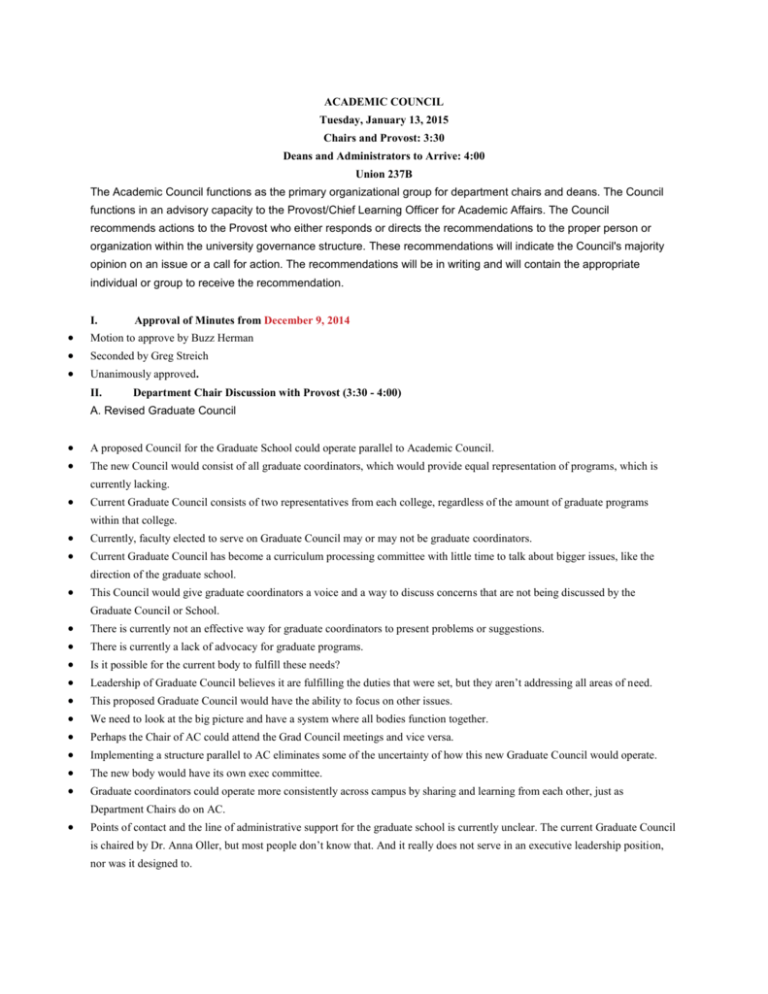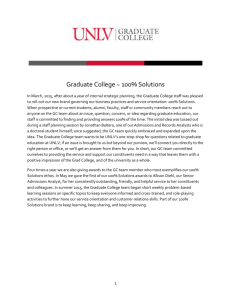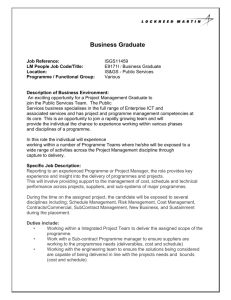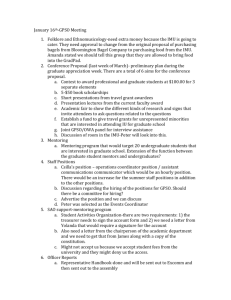2015
advertisement

ACADEMIC COUNCIL Tuesday, January 13, 2015 Chairs and Provost: 3:30 Deans and Administrators to Arrive: 4:00 Union 237B The Academic Council functions as the primary organizational group for department chairs and deans. The Council functions in an advisory capacity to the Provost/Chief Learning Officer for Academic Affairs. The Council recommends actions to the Provost who either responds or directs the recommendations to the proper person or organization within the university governance structure. These recommendations will indicate the Council's majority opinion on an issue or a call for action. The recommendations will be in writing and will contain the appropriate individual or group to receive the recommendation. I. Approval of Minutes from December 9, 2014 Motion to approve by Buzz Herman Seconded by Greg Streich Unanimously approved. II. Department Chair Discussion with Provost (3:30 - 4:00) A. Revised Graduate Council A proposed Council for the Graduate School could operate parallel to Academic Council. The new Council would consist of all graduate coordinators, which would provide equal representation of programs, which is currently lacking. Current Graduate Council consists of two representatives from each college, regardless of the amount of graduate programs within that college. Currently, faculty elected to serve on Graduate Council may or may not be graduate coordinators. Current Graduate Council has become a curriculum processing committee with little time to talk about bigger issues, like the direction of the graduate school. This Council would give graduate coordinators a voice and a way to discuss concerns that are not being discussed by the Graduate Council or School. There is currently not an effective way for graduate coordinators to present problems or suggestions. There is currently a lack of advocacy for graduate programs. Is it possible for the current body to fulfill these needs? Leadership of Graduate Council believes it are fulfilling the duties that were set, but they aren’t addressing all areas of need. This proposed Graduate Council would have the ability to focus on other issues. We need to look at the big picture and have a system where all bodies function together. Perhaps the Chair of AC could attend the Grad Council meetings and vice versa. Implementing a structure parallel to AC eliminates some of the uncertainty of how this new Graduate Council would operate. The new body would have its own exec committee. Graduate coordinators could operate more consistently across campus by sharing and learning from each other, just as Department Chairs do on AC. Points of contact and the line of administrative support for the graduate school is currently unclear. The current Graduate Council is chaired by Dr. Anna Oller, but most people don’t know that. And it really does not serve in an executive leadership position, nor was it designed to. Executive Leadership: There is no Dean of the Graduate School. The Graduate School will soon have new leadership - Vice Provost for Academic Programs and Services, but that will only be one of that person’s responsibilities Provost Curtis stated that there is no gap in leadership and that better communication could make leadership lines more clear. A concern was raised that perhaps we need to discuss any changes in structure with the new Vice Provost. Is it more effective for the faculty to present the Vice Provost with an idea of restructuring or vice versa? Or should the change happen before that person is hired? Good leadership of the graduate school is a combination of structure and leadership. In the past, there were times when faculty were well aware of the Graduate School, because of sufficient communication from Grad School leaders. In the past, faculty had monetary incentives to chair a thesis. The recent joining of Extended Campus with the Grad School was not viewed as ideal by many people in the Grad School or the faculty. This discussion will be continued. Send questions to your rep on the exec, so they can discuss next month. Provost Curtis will bring this discussion to the Grad Council as well. AC discussed it first only because it was brought up by AC. III. Questions regarding written reports No written reports were submitted. IV. Information Items V. Discussion Items A. Loading of Class Schedule (Teri B. or Laura M.) Since 2007, each semester’s schedule is automatically loaded from the previous year’s schedule. Fall schedule will become viewable to students Jan 23rd and summer schedule was viewable before the break. Viewable dates are based on student enrollment dates. By having the schedule viewable before enrollment, students can catch errors that can be corrected before actual enrollment. Is it necessary for students to see their schedule two months before they can register? Schedules become viewable to students on a set date, whether departments have revised the schedule or not. Chairs would like a way to let students know that the schedule they are viewing may change. It is difficult to present an accurate schedule by such an early viewable date. Some new faculty have not even been hired, so there is no way to know what their schedules will be. Advisors are already advising students on future semesters with incorrect information. Curriculum doesn’t finish its process until after students need to register, so certain classes cannot be entered, because there isn’t a course number yet. With such an early viewable date, chairs debate whether to put a very inaccurate schedule up early, or wait until later to post a more accurate schedule. It is possible to hide classes from students’ view, but that isn’t a solution, because students will ask why a certain class isn’t being offered as planned. Registrar will look into adding a way for departments to indicate that the schedule is subject to change. B. Final Exam Scheduling (Teri) Regularly scheduled finals create conflicts for hybrid courses that don’t fit in the traditional time slots. Please inform Registrar when you have a specific conflict so they can come up with a solution. CSC should have the same finals schedule as the main campus, although the language may not be clear. Final exams are not supposed to be given off schedule. Finals cannot be given a week early. Night classes should take finals exams on the week of finals. Students can pay a small fee to take finals early, if it is approved by Student Engagement and the professor. Even if Student Engagement approves, the faculty member does not have to approve an early exam. It is not acceptable for students to take their final exams before Thanksgiving Break simply because it may be cost prohibitive for them to travel back to campus after Thanksgiving. Perhaps final exam guidelines need to be more clear. Is adaptive release permissible in online classes? Potentially, students could finish the course early, because the next module opens as soon as the previous one is completed. Can take-home or online finals be submitted before finals week? Concerns about waiting until the end of the semester to award a high percentage of points in the class. Other institutions limit the amount of points that can be earned in the last weeks of the semester, so students can know where they stand sooner. UCM does not limit the distribution of points and such a policy would be detrimental for some programs. Faculty should be letting students know by midterm where they stand in the course. AC exec will further discuss finals policies with Mike Grelle. VI. Action Item VII. Future Agenda Items A.Sabbaticals Thank you to Dean Roger Best and the Harmon College of Business and Professional Studies for providing the snacks and refreshments for our meeting today MEETING SCHEDULE Remaining Schedule for 2014-2015 February 10 2015 3:30 Union 237B March 10 2015 3:30 Union 238 April 14 2015 3:30 Union 237B May 12 2015 3:00 * Union 237A June 9 2015 3:00 * WDE 2401



